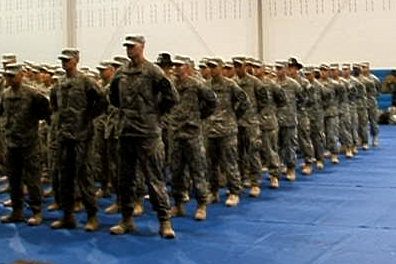________________________________________________________________
Things you should avoid talking about with returning military personnel
You see the news, you have questions, or you just want to strike up conversation. Here are some key things to consider:
What not to say to returning military personnel
by Andrea J. Westfall
These are general guidelines when interacting with a veteran
and should not be considered absolutely true for every
veteran. Every Soldier, Marine, Airman, or Sailor that has
been deployed to Iraq, Afghanistan, Vietnam, Somalia or any
other combat theater has had a different combat experience.
How they deal with their experiences will vary depending upon
age, culture, faith, gender, community support, and the
presence of or lack of a family and/or social support system.
A combat veteran is not the same person they were before
being deployed, and how the civilian population interacts with
them can either help or hinder their transition.
1. Did you kill any anyone?
It would seem that common sense would deem this an inappropriate question; however, this question is asked a lot. What purpose does this serve the individual asking to know this about the veteran?
2. What was the nastiest or most disgusting thing you saw over there?
If the veteran wants to share this kind of detail they might, but ONLY after trust has been established. However, the chance they will want to relive the details of those events, which might be very traumatic, could be slim to none.
3. Are you glad to be home?
Consider for a moment what these words could be asking: “Are you glad that you are no longer in a situation where you are getting shot at, missiles being fired at you on a regular basis, the threat of your vehicle being blown up every time you get in it, sand storms and 140 degree temperatures?” It is also important to be aware that the veteran’s homecoming was more traumatic than being at war. Some come home financially desolate because the person they trusted to take care of their finances spent ALL their money. Others come home thinking they will be welcomed by their spouse only to find they have been unfaithful, usually with someone close to them such as a brother and/or best friend, and they are being handed divorce papers.
4. How are you doing?
This question should really only be asked when you are willing to stay and listen to the answer. Most likely the veteran doesn’t know how they are doing and definitely may not know how to express it. It is okay not to know what to do with the answer because there isn’t anything you can say to fix it or make it better. Just being there so the veteran can debrief for just a moment can be enough.
5. Did you see the news…?
And then proceed to go on and share what gruesome thing that has just happened in Iraq/Afghanistan, or how many Americans have been killed. The veteran has lived the news and doesn’t need to relive it through the present media and certainly does not need to hear about it. The war is personal to the veteran and most likely they know people still fighting and dying over there.
6. Do you feel guilty about what you had to do during the war?
Just about any combat veteran will have some measure of guilt. Those who make it home alive, although grateful, have survivor’s guilt. Those who participated in direct combat had to make decisions that ultimately resulted in taking human life, to include women and children. These individuals generally have tremendous guilt but may not know how to identify it let alone admit it.
7. Do you want to go get a drink?
This generally becomes a BIG problem later so do not be the one to help them start self-medicating and on the path to destruction with chemicals. Coffee is a much better addiction and easier to quit.
8. Do you want me to pray with you?
This should be automatic. You may not know what to pray for but the Holy Spirit knows what the veteran needs and will direct. And, the veteran may be very angry at God and prayer or the mention of God is the last thing they will find helpful or needed.
9. What do you think about the U.S. being over there and don’t you think we should get out?
It is not a good idea to bring up politics concerning the hell they were sent into and have just come out of. Their perspective, because of experience, is going to be very different than the average civilian getting information from CNN.
10. Do you think God could ever forgive you?
There are people out there who are extremely opposed to the war and blame the military for the destruction and loss of life they see on television. These individuals seem unable to distinguish between their politics and the individual soldier. The veteran will have some measure of guilt no matter what their job was, so do not make it worse by helping them along with the notion they can never be forgiven for the things they had to do to protect themselves and their battle buddies.
11. Did you see any dead bodies?
Again, if the veteran should want to share this very intimate detail of their deployment they might. However, this may occur after time but be prepared that they just will not share.
12. Do not tell a veteran that you understand what they are going through and then share a personal/unrelated story.
There really is no way to completely understand going to war unless you have been there. No experience you have had can come close to the stress, terror, guilt, and hell of war. However, God can use your experiences/trauma to extend compassion and empathy, which does not always require words. You don’t have to understand what they’ve been through, but to recognize this was something incredibly painful for them will show the veteran that you do care.
13. DO NOT, even in a joking manner, tell a veteran that they should be grateful they made it home alive, didn’t die, need to get over it, and be happy.
There is already a good chance that they wished they had been killed in action. Coming home is much more difficult than combat. The veteran knows what is expected during the heat of battle. They rely on training and the instinct to survive. There is no training manual for coming home and there is no debriefing that can fully prepare the veteran for how difficult it will be. As a result, many desire to go back to Iraq or Afghanistan because they know who they are and how to survive in that world. Back in the civilian world, feelings of helplessness are often overwhelming, and suicide seems to be the only option.
14. Do not, even if the intention is sincere, tell a veteran, “If you need anything just let me know”.
The veteran generally has no idea what they need let alone has the energy or strength to call someone for help. Many suffer through the frustration of having just come from commanding, fighting, and running on an unnatural level of adrenaline. If you see any need and you have the ability to meet that need don’t wait until they ask, do it!
________________________________________________________________
Another military veteran has added these questions to avoid:
I don't know anything about what you are going through, I've never served, (or have but not to combat)
Translation: "You are abnormal, I fear talking to you, and am walking on eggshells." This is like going to a job interview, walking in and shaking hands with the boss and saying " I am completely under qualified and should not get this job."
Did you kill anyone?
Believe it or not, quite often those who have little understanding of the military attempt to open communication by any means possible. This is quite counterproductive because if the soldier has in fact engaged the enemy, they probably struggle internally with many issues resulting, and stirring that up is no way to make a friend! Secondly, as the war moves forward, deployed soldiers can often experience no hostile contact over a 12 month deployment which can make them feel less significant than previously deployed soldiers. Also not so good for making a friend!
What was it like over there?
Again seemingly innocent question, this can often be a conversation killer. This question comes up more often than not, and 9 times out of ten it stirs up unwanted memories. Remember why you are communicating with this soldier, you are not there to further your education, or better understand what soldiers see, you are there for the soldier, so let him/her do the leading.
________________________________________________________________
So what do you say to returning military personnel?
Contributed by Josh Renschler
This is so important for everyone to understand. Soldiers are people; pushed to the extreme, yes, but still people.
- Ask them how things have been for them since coming home.
- How is their marriage?
- How have they been dealing with the transition from post deployment to home life?
- Do they have children... how is that going?
As you cover the same topics you would with any other person, you will open the doors for them to communicate what they need to.
- Assess their needs.
- Develop a prayer list.
- See if any of their needs can be aided by your church or known organization.
Stay away from talking about their work, because that is about as foreign as the Egyptian language.
Insights in caring
What military personnel wish you understood:
Returning
Military Personnel
Copyright 2008 - 2022 Benita Koeman, Operation We Are Here. All rights reserved.
Operation We Are Here is a HUB of RESOURCES for the military community and military supporters.
Military support is not a concept to embrace; military support is sacrificial action. Visit our military support TOOLKIT.
Resources for supporters of military and veteran families
- Practical insights in caring for
Military and veteran family resources
- Christian encouragement
- Deployment support for
- Downloads and printables
Operation We Are Here
Follow us on
resources


